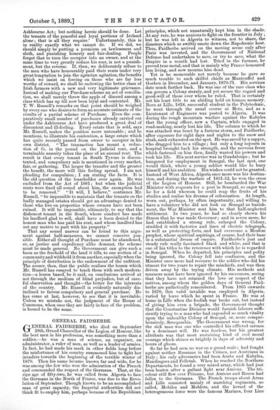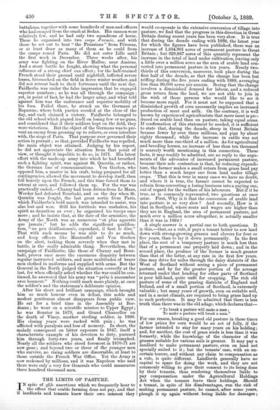GENERAL FAIDHERBE. principles, which not unnaturally kept him in the
shade. At any rate, he was anxious to fight on the frontier in July ; but he was left in Algeria to witness, not to share, the disasters which so swiftly smote down the Napoleonic host. Thus, Faidherbe arrived on the moving scene only after Paris was invested, and the Government of National Defence had undertaken to save, or try to save, what the Empire in a month had lost. Tried in the furnace, he proved true metal, and that is mainly why France honoured him living, and now mourns him dead. Yet is he memorable not merely because he gave so much trouble to such skilful chiefs as Manteuffel and Goeben in December, and January, 1870-71. His services date much further back. He was one of the rare class who can govern a Colony sternly, and yet secure the regard and good-will of those over whom he ruled. That is certainly not his least title to an abiding hold on human memory. Born at Lille, 1818, successful student in the Polytechnic, he went through the usual course at Metz, and as a Lieutenant of Engineers was posted to Algeria. It was during the rough mountain warfare against the Kabyles that the young officer, now a Captain, while engaged in road-making, nearly lost his life. The column to which he was attached was beset by a furious storm, and Faidherbe, after exposure for eight days and nights to the snow and slush, sank exhausted on the spot. He was saved by a sapper, who dragged. him to a village ; but only a long sojourn in hospital brought back his strength, and the nervous fever which fastened on him then, finally wasted. his powers and took his life. His next service was in Guadaloupe ; but he hungered for employment in Senegal, the last spot, one would think, where a young soldier would like to bury himself and his ambition. His wishes could not be granted. Instead of West Africa, Algeria once more was his destina- tion, and during the warfare of 1851-52, he won the cross of the Legion of Honour. Still, he bombarded the War Minister with requests for a post in Senegal, so eager was he for a field whereon he could reap the fruits of his studies and realise his dreams of colonisation. At length, worn out, perhaps, by often importunity, and willing to have a volunteer who did not look on Senegal as banish- ment, the War Minister sent him to that half-neglected settlement. In two years, he had so clearly shown his fitness that he was made Governor; and in seven more, he had established a strong rule, enlarged the Colony, studded it with factories and lines of electric telegraph, as well as protecting forts, and had overcome a Moslem prophet, whose spiritual aspirings, of course, had their base in a substantial dream of empire. Faidherbe's just and steady rule really fascinated black and white, and that is one of his titles to the reverence with which he is regarded in Senegal. When he departed, his principles and polity being ignored, the Colony fell into confusion, and the Minister once more had recourse to the soldier who did his utmost for two years to repair the mischiefs, and was them driven away by the trying climate. His methods and manners must have been ignored by his successors, seeing that they have not retained the love or respect of the natives, among whom the golden days of General Faid- herbe are pathetically remembered. From 1865 onwards. to 1870, this valid invalide was employed in Algeria, varied by leave which he spent in France. He was at home in Lille when the foolish war broke out, but instead of giving him even a brigade, the Government thought that the Constantine Division would furnish labours suffi- ciently trying to a man who had expended so much vitality upon the unhealthy Colony of Senegal, or, more compre- hensively, Senegambia. The Government was wrong, for the sick man was one who controlled his afflicted carcass by a dominant will. He was fearless, but his greatest attribute was that most sustaining kind of cool moral courage which shines so brightly in days of adversity and hours of gloom. So far he had seen no war on a grand scale ; had fought against neither Russians in the Crimea, nor Austrians in Italy ; his only adversaries had been Arabs and Kabyles, Mandingoes and Felletah. When he reached the Northern Departments, he found a very mixed army, which had just been beaten after a gallant fight near Amiens The tri- colour still flew over Peroune, but Amiens and Rouen had fallen to the Germans. The French troops about Arras and Lille consisted mainly of marching regiments, so called, Mobiles and Moblots, and the kernel of the heterogeneous force were the famous Marines, four Line battalions, together with some hundreds of men and officers who had escaped from the crash at Sedan. His cannon were relatively few, and he had only two squadrons of horse. These he organised into two corps d'armee, and with those he set out to beat " the Prussians " from Peronne, or at least draw as many of them as he could from the camps round Paris. He did not enter Lille until the first week in December. Three weeks after, his army was fighting on the River Hallue, near Amiens. And a stout battle he fought, showing what the personal influence of a strong chief can effect ; for the half-trained French stood their ground until nightfall, inflicted severe losses, bivouacked on the field in fierce winter weather, and did not retreat back to their fortresses until the next day. Faidherbe was under the false impression that he engaged superior numbers ; so he was all through the campaign ; yet, in point of fact, he had the larger army, and what told against him was the endurance and superior mobility of his foes. Foiled there, he struck on the Germans at Bapaume, where both parties receded at the close of the day, and each claimed a victory. Faidherbe belonged to the old school which piqued itself on losing few or no guns, and considered that if their soldiers kept on the field, they were victorious. But the object of the Germans was to pre- vent an enemy from pressing up to relieve, or even interfere with, the siege of Paris. That purpose ever governed their action in pursuit ; so that, provided Faidherbe was repelled, the main object was attained. Judging by his report, he did not appreciate the situation from that point of view, or thought it impolitic to do so, in 1871. His latest effort with the made-up army into which he had breathed such a fighting spirit, was against St. Quentin, or rather, the German line of communications. Von Goeben, who opposed him, a master in his craft, being prepared for all contingencies, allowed the movement to develop itself, then fell heavily upon the French, and this time forced them to retreat at once, and followed them up. For the war was practically ended,—Chanzy had been driven from Le Mans, Werder had defeated Bourbaki, and on the day when St. Quentin was fought, the last great sortie from Paris, which Faidherbe's bold march was intended to assist, was also lost and won. Still his fortitude was unshaken, his spirit as dauntless as ever ; he organised his troops once more ; and he insists that, at the date of the armistice, the Army of the North was as numerous "et plus aguerrie que jamais ;" but he adds the significant qualifica- tion, " un peu desillusionnee, cependant, it faut le dire." That with such means he was able to do so much, and keep officers like Manteuffel and Von Goeben on the alert, tasking them severely when they met in battle, is the really admirable thing. Nevertheless, the campaign of Faidherbe, like those of Chanzy and Bour- baki, proves once more the enormous disparity between regular instructed soldiers, and mere multitudes of brave men clothed in uniforms and supplied with arms. But the General in the North judged the situation correctly at the last, for when officially asked whether the war could be con- tinued, he answered that his army was " prete a succomber avec honneur." Nothing could mark more plainly, at once the soldier's and the statesman's deliberate opinion.
After his short and brilliant campaign, which brought him so much honour even in defeat, this noble and modest gentleman almost disappears from public view. He sat for a brief time in the Assembly at Bor- deaux ; he went on a scientific mission to Upper Egypt ; he was Senator in 1879, and Grand Chancellor on the death of Vinoy, another sterling soldier, in 1880. His closing years were racked with pain ; he was afflicted with paralysis and loss of memory. In short, the malady consequent on bitter exposure in 1847, itself a characteristic example of his devotion to duty, pursued him through forty-two years, and finally triumphed. Nearly all the soldiers who stood foremost in 1870-71 are now gone ; and beyond two or three of the younger men who survive, no rising soldiers are discernible, at least to those outside the French War Office. Yet the Army is now reckoned by millions, and it was Napoleon who said there were only a very few Generals who could manoeuvre three hundred thousand men.







































 Previous page
Previous page